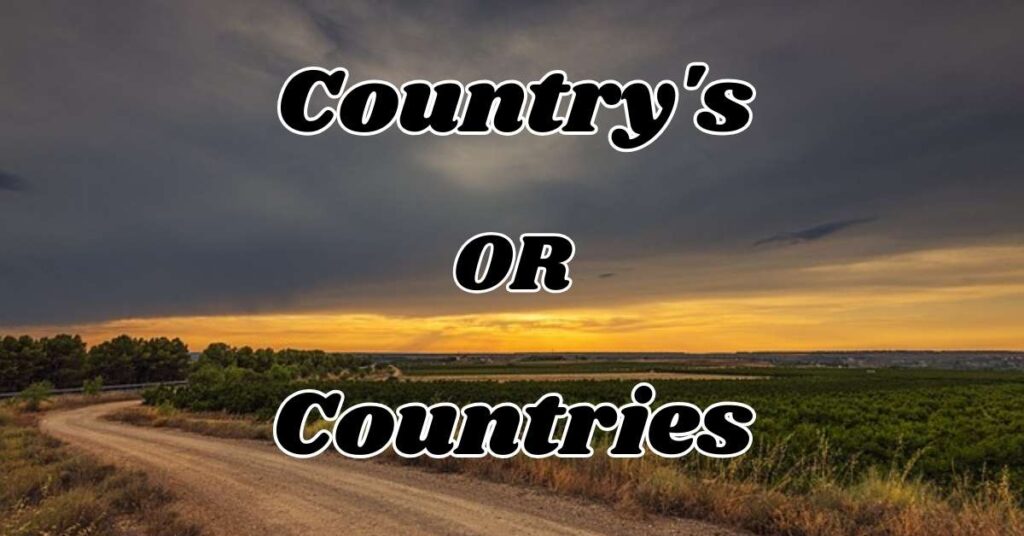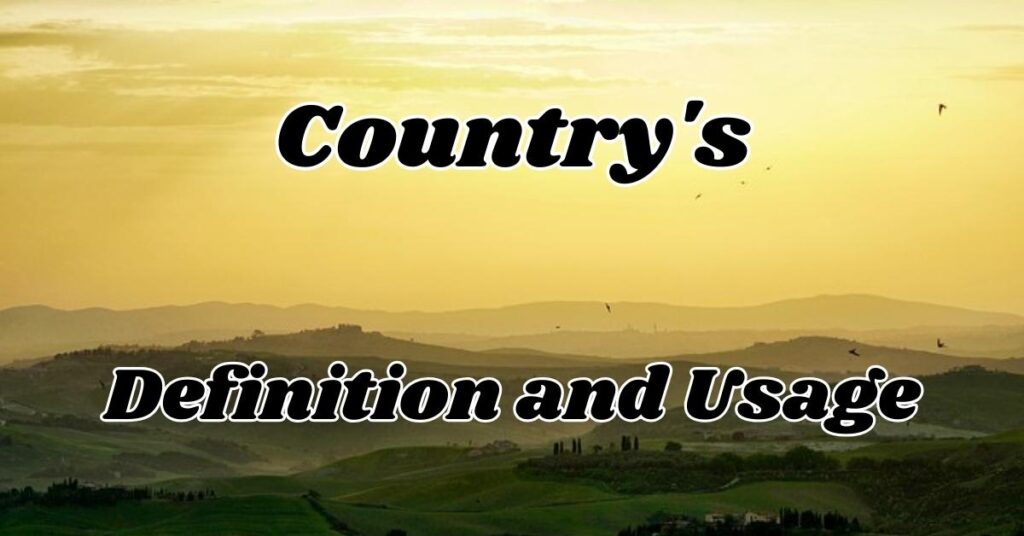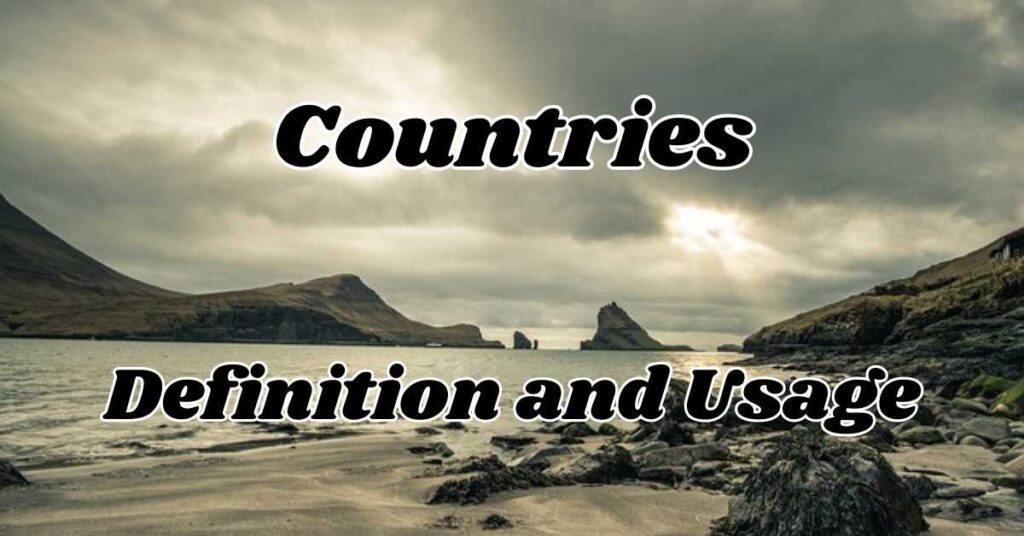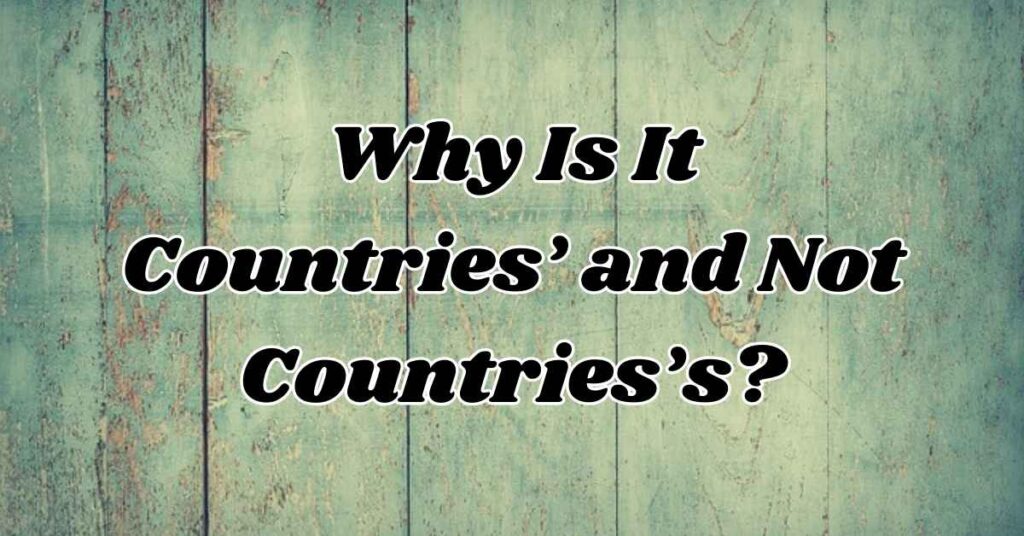Country’s or Countries understanding the difference between these two terms is essential for clear and effective communication in English. Many people often confuse country’s, the singular possessive form, with countries, which refers to multiple nations.
This confusion can lead to misunderstandings in writing and conversation. In this article, we will explore the definitions, usages, and grammatical rules surrounding country’s and countries. By clarifying their meanings and providing practical examples, you’ll gain the confidence to use these terms correctly.
Whether discussing a single nation’s attributes or referring to multiple nations, mastering this distinction will enhance your writing skills and ensure your messages are precise and clear.
Quick Summary
In this article, we will clarify when to use country’s and when to use countries. We’ll explore their definitions, origins, and grammatical roles. By the end, you will understand how to use these terms correctly in different contexts, ensuring your writing is clear and effective. Mastering this distinction will enhance your communication skills significantly.
Understanding Country’s or Countries

country’s and countries serve different purposes in English. Country’s is the singular possessive form of the noun “country,” indicating ownership or belonging.
For example, when we say “the country’s economy,” we refer to the economy of one specific country. On the other hand, countries is simply the plural form of “country,” referring to more than one nation. For instance, “the countries of Europe” includes multiple nations within that continent.
Many people mistakenly use these terms interchangeably, but they have distinct meanings that can change the message of a sentence. Understanding their differences is crucial for effective communication.
Origins of the Countries
Countries has its roots in Latin and Old French, similar to the word country. The evolution from country to countries adheres to standard English pluralization rules. Specifically, when a noun ends in “y,” we replace the “y” with “ies” to create the plural form.
Therefore, one country becomes many countries, reflecting the diversity and richness of multiple nations around the world. Understanding this origin helps clarify its usage in language.
Country’s: Definition and Usage

Country’s is the singular possessive form of the noun “country.” It indicates ownership or belonging, showing that something is associated with a specific nation.
For example, when we say “the country’s capital,” we refer to the capital city that belongs to that particular country. Understanding this definition is crucial for using the term correctly in sentences where possession is implied.
Country’s Definition
Country’s specifically denote a relationship of ownership between a country and its attributes. This possessive form allows us to discuss things like the country’s economy, culture, or government.
By using country’s, we emphasize that these elements belong to one nation, making it clear which country we are talking about in our writing.
Country’s: Singular Possessive
Country’s is used to highlight one nation’s characteristics or possessions. For instance, in phrases like “the country’s leaders,” we focus on the individuals who govern that specific country.
This grammatical structure helps convey important information about a nation while maintaining clarity and precision in our language.
Country’s Usage
Country’s correctly in your writing is essential for conveying clear meaning. This term indicates possession, showing that something belongs to a specific nation. For example, when you say “the country’s economy,” you are referring to the economic conditions of one particular country.
It’s important to remember that a country is always used in contexts where you want to highlight ownership or attributes related to a single nation. By understanding this, you can enhance the clarity of your sentences and ensure your readers grasp the intended message.
How to Use Country’s
Country’s effectively, start by identifying the noun or attribute that belongs to the country you are discussing. For instance, phrases like “the country’s flag” or “the country’s culture” emphasize what is unique to that nation.
Always ensure that the context clearly indicates you are referring to one specific country. This will help avoid confusion with the plural form, countries, which refers to multiple nations without indicating possession. By practicing this usage, you will improve your writing accuracy and communication skills
Synonyms of Country’s
While there are not direct synonyms for possessive forms like country’s, you can describe similar ideas using phrases such as:
- Nation’s
- State’s
- Territory’s
- Region’s
- Land’s
- Area’s
- Province’s
- Kingdom’s
- Republic’s
- Federation’s
These alternatives can help vary your language while maintaining clarity about ownership.
Countries: Definition and Usage

The term countries is the plural form of “country,” referring to more than one nation. It encompasses a variety of nations, each with its own unique culture, government, and economy.
For example, when we say “the countries of Asia,” we are talking about multiple nations within that continent. Understanding this definition is crucial for using countries accurately in discussions about global geography and international relations.
Countries Definition
Countries refer to multiple nations collectively. This term does not imply any ownership or possessiveness; rather, it simply indicates that there are many distinct nations.
For instance, phrases like “the countries of Europe” highlight the diversity and richness of different cultures and governments without suggesting any relationship of possession between them.
Plural Possessive: Countries
When discussing ownership related to multiple nations, we use the plural possessive form, countries’. This structure indicates that something belongs to more than one country. For example, “the countries’ leaders” refers to the leaders from various nations.
Understanding how to use this form correctly helps clarify relationships and attributes associated with multiple countries in your writing.
Countries Usage
Using countries correctly in your writing is essential for clear communication. This term refers to multiple nations without implying ownership. For instance, when you say “the countries of Africa,” you are discussing various nations collectively. It’s important to use countries in contexts where you want to highlight diversity or comparisons among different nations.
How to Use Countries
Use countries effectively, focus on contexts that involve more than one nation. Phrases like “many countries collaborate on trade” or “the countries’ cultures vary greatly” illustrate the term’s usage well.
Always ensure that your sentence structure clearly indicates you are referring to multiple nations, helping your readers understand the broader context of your discussion.
Share
Synonyms of Countries
For variety in your writing about multiple nations, consider these synonyms:
- Nations
- States
- Territories
- Regions
- Lands
- Areas
- Provinces
- Kingdoms
- Republics
- Federations
Using these terms can enrich your language while maintaining clarity about what you mean.
Side by Side Comparison
To make things clearer, here is a simple comparison:
| Term | Type | Example |
| country’s | Singular possessive | The country’s capital |
| countries | Plural | Many countries have borders |
| countries’ | Plural possessive | The countries’ economies |
This table illustrates how each term functions differently in sentences.
Everyday Usage Examples

Understanding how to use country’s in everyday language can significantly enhance your communication skills. This term is often used to describe attributes or possessions related to a specific nation.
For example, you might refer to “the country’s history” or “the country’s traditions.” These phrases help convey important information about what defines a particular nation. By incorporating country’s into your writing, you can provide clarity and depth when discussing various aspects of a nation.
Examples of Country’s in Sentences
Here are examples of country’s used in sentences:
- The country’s flag represents its values and heritage.
- Each country’s education system varies significantly.
- The country’s leaders met to discuss environmental issues.
- A country’s culture is shaped by its history and people.
- The country’s economy has shown remarkable growth this year.
Examples of Countries in Sentences
Here are examples of countries used in sentences:
- Many countries are working together to combat climate change.
- The countries of South America share many cultural similarities.
- Several countries have imposed travel restrictions due to health concerns.
- The countries involved in the treaty agreed on new trade terms.
- Different countries celebrate their independence on various dates.
You May also Like: Hommus vs Hummus: Which One is Correct?
Why Is It Countries’ and Not Countries’s?

The plural possessive form of countries is written as countries’, with the apostrophe placed after the “s.” This rule applies to nouns that are plural and end in “s.”
By adding just the apostrophe, we indicate ownership among multiple nations. For example, “the countries’ economies” refers to the economies belonging to various nations, maintaining clarity and simplicity in your writing.
Now You Know When to Choose Country’s or Countries
Understand the differences between country’s vs countries, you can confidently choose the correct term in your writing. Remember that country indicates singular possession, while countries refers to multiple nations without ownership.
Practicing these distinctions will enhance your communication skills and ensure your messages are clear. With this knowledge, you can effectively discuss various aspects of nations and their relationships.
FAQs: Country’s or Countries
Is country’s a word?
Yes, country’s is a word, serving as the singular possessive form of “country,” indicating ownership or belonging.
Country’s economy?
The phrase country’s economy refers to the economic system and financial activities of a specific nation.
Countries of the world?
The term countries of the world encompasses all recognized nations globally, each with its own unique culture and government.
What is the plural of country?
The plural of country is countries, formed by changing the “y” to “ies.”
What are countries’ meanings?
Countries refers to multiple nations, indicating distinct territories with their own governments and cultures.
Conclusion
Mastering the distinction between country’s or countries is essential for effective communication in English. Understanding that country indicates singular possession, while countries refer to multiple nations without ownership will enhance your writing clarity.
By applying the rules and examples provided in this article, you can confidently use these terms in various contexts. Whether discussing a single nation’s attributes or comparing multiple nations, knowing when to choose country’s and countries will significantly improve your language skills and overall expression
Related Post: Tomorrow or Tommorrow: What’s the Difference?

